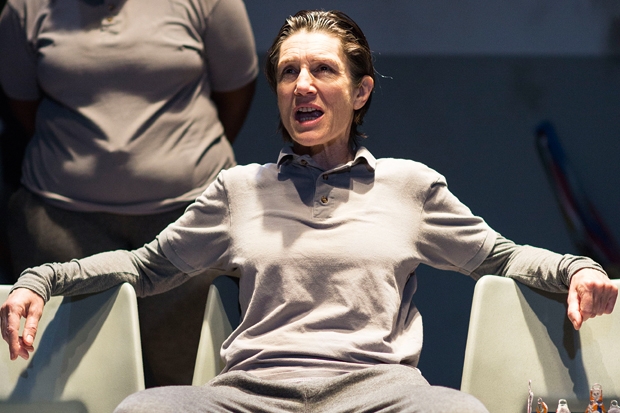The age of ‘ladies first’ is back. Phyllida Lloyd reserves all the roles for the weaker sex, as I imagine she thinks of them, in this hybrid play assembled from Henry IV (i) and (ii). It’s a twin-layered production that poses as a piece of am-dram mounted in a women’s nick. The Donmar has been refitted, in and out, to resemble a prison. (Quite an expense. And there’s no interval either, so there are no bar profits to subsidise the fancy-dress party.) As we arrive we’re barked at by ushers attired as screws who harry and scold us into our plastic seats. Nothing surprising in this uppity aggression. Contempt for audiences is common among high-end theatre types: anyone ready to spend 30 quid on amusement deserves to be punished.
The prison setting makes sense during the tavern scenes but generates weird anomalies everywhere else. The wrong-sex casting is blind to nuances of age and region, so many crucial distinctions are smudged. Clare Dunne plays Hal, a Lancastrian, with a clotted north Dublin accent. Her stroppy, self-conscious performance is full of gestures that seem to have been selected for, not by, her. Her dad, Henry IV, is played by posh Harriet Walter whose slick dark hairstyle and drawn, smoker’s face make her look like Peter O’Toole imitating David Bowie, or the late Tom Bell having a stab at Albert Steptoe. She certainly doesn’t look female which in this context is, I believe, a high compliment. (But she won’t be pasting any production shots from this show into her personal scrapbook.) Ashley McGuire is excellent as a laid-back White Dee-ish Falstaff. And Jade Anouka is great to watch but she can’t hope to suggest the romantic agonies of Hotspur, one of Shakespeare’s tastiest roles. The dashing young baron foments revolt in Henry’s northern provinces but his destructive charm drives him to martyrdom. To capture this complex and fascinating medieval tragedy all we get is a skinny kid in a sports bra romping around a dingy gym posing as a London nick. And the long amorous scenes between Hotspur and Lady Percy (Sharon Rooney) look like some trite girl-on-girl bust-up near a kebab shop.
The director’s Big Idea needs to justify the effort and dosh expended on its construction so the Shakespeare play occasionally breaks down and the thesps become make-believe convicts arguing about their lines and swinging their fists. The make-believe screws then rush on stage and perform a make-believe intervention. All done? Good. The play reverts to an am-dram show in a prison (i.e., to two levels of fakery rather than one). It’s exhausting, really, but don’t worry. This isn’t aimed at you or me. It’s for the inner sanctum, the theatrical elite, the polysyllabic Arts Council supremos, the nib-scratching PhD soloists, the professors of literary landfill, the footnote-proliferating Euro-directors. It’s for anyone who’s seen so much Shakespeare they want it served up in this botched, sabotaged Cubist edition.
Notes from Underground is the Print Room’s first offering at its cosy new kennel in a former cinema. Lights up. An armchair, a standard lamp, a seated scruff. He’s posh, English and rich. Private money, he confides. He adds that everyone on earth is his intellectual inferior. Evidence for this claim is rather hard to find as he rants chippily at us for 70 minutes. Lean back in the front row, ladies and gentlemen, as those confetti bursts of silvery gob come spuming your way. Even in Row F, I barely escaped the oral excreta. The show, salvaged from the Dostoevsky slush pile, is a muddle of half-clues. The nameless soliloquist wears the moth-eaten posh-togs of the overeducated Victorian loser but he adds references to the 21st century. So when is this? Who is he? Where’s he from? What’s he after? Why so grouchy?
The script’s refusal to deal with these introductory courtesies makes the monologue impossible to identify with. And identification is central to any artistic enterprise, as good old Aristotle pointed out quite a long time ago. We feel pleasure when we recognise that ‘this is that’, and our susceptibility to shocked delight forms the aesthetic basis of all imitative art. So to call this an artistic catastrophe would be to praise it too highly. This isn’t art. It’s bedsit narcissism fittingly enacted by Harry Lloyd whose nervy, cold, abrasive, self-satisfied and humourless performance is far too large for this compact venue. He honks out his gobbets of twaddle as if delivering farewells to the quayside from a departing liner. Calm down, mate. You’re not doing Hamlet at Epidaurus. And yet, some intuition tells me Harry Lloyd thinks he’s an exceptional dramatic property. And that’s not a quality I disparage in the slightest. Sometimes self-belief is all that matters.







Comments